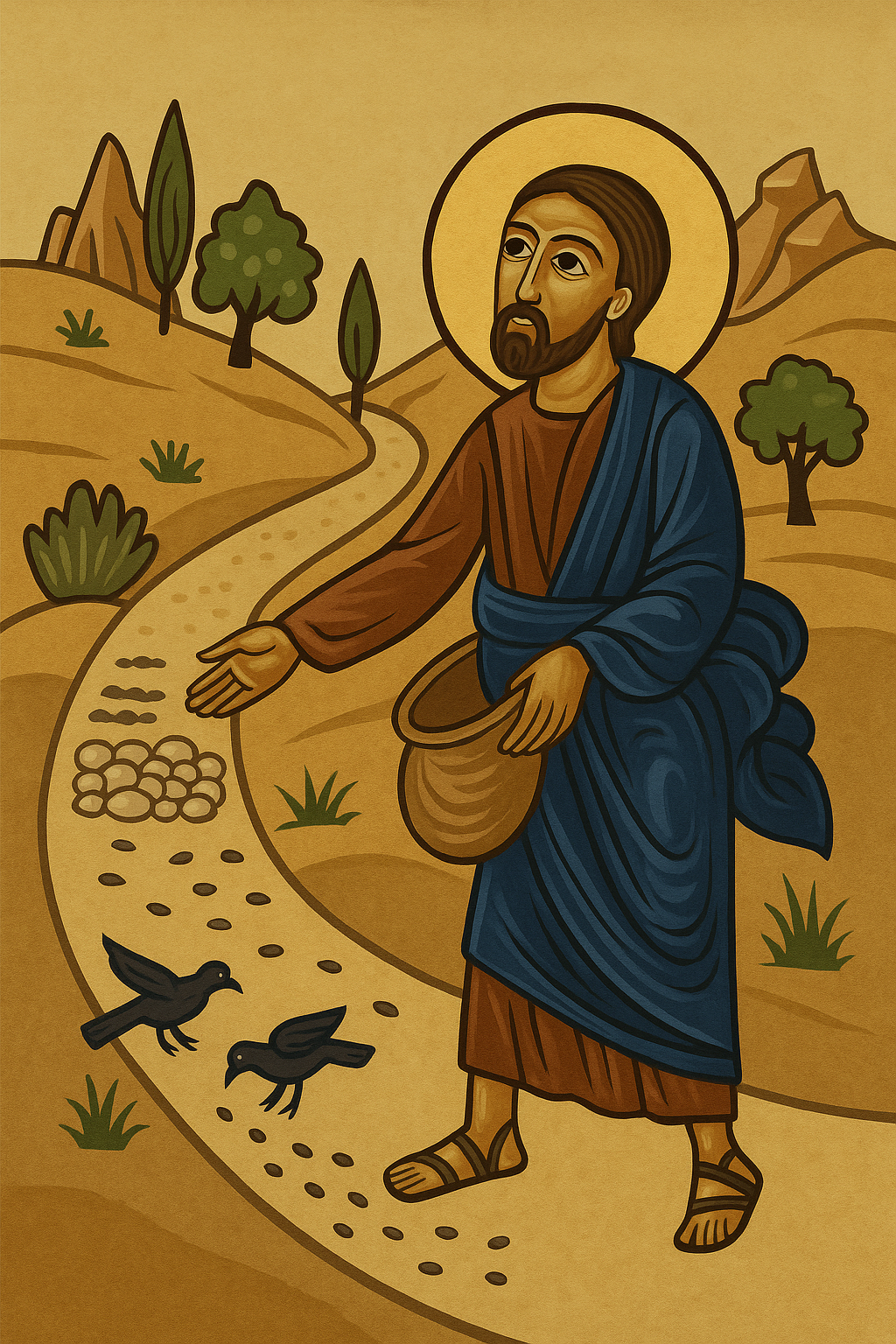Parables of Jesus – The Sower
The Soil of My Heart: A Spiritual Map from the Parable of the Sower
In the Name of the Father, and the Son, and the Holy Spirit, One God. Amen.
May the blessing of the Father who calls us and His Only Begotten Son Jesus Christ who saves us,
and the Holy Spirit who sanctifies and transforms us be with us all,
that we may hear His word and bear fruit—thirty, sixty, and a hundredfold. Amen.
Introduction: A Parable Foundational to the Gospel
The Parable of the Sower appears in all three Synoptic Gospels—Matthew 13:1–9, Mark 4:1–9, and Luke 8:4–8. This alone sets it apart as a cornerstone of Christ’s teaching ministry. In fact, in Mark’s account, Jesus even says, “Do you not understand this parable? How then will you understand all the parables?” (Mark 4:13, NKJV). The Lord places the interpretation of this parable as a key for unlocking the rest. It is not simply a rural analogy; it is a mirror for the heart of every hearer.
Here, the divine Sower goes out to sow—not randomly, but purposefully, with love and truth. Yet the same seed—the Word of God—falls on different soils, representing different hearts. And to each listener Christ issues this urgent invitation:
“He who has ears to hear, let him hear!” (Matthew 13:9, NKJV)
This is more than physical hearing—it is a deep call to self-examination, repentance, and transformation. Christ’s word reveals not only who He is—but who we are.
Two Responses: Hearing with the Heart
In the Gospel of Luke, we meet a woman named Mary—sister of Martha and Lazarus. When Jesus visited their home, Mary “sat at Jesus’ feet and heard His word” (Luke 10:39, NKJV). She opened her heart like good soil, ready to receive. Christ praised her, saying:
“Mary has chosen that good part, which will not be taken away from her.” (Luke 10:42, NKJV)
Her hearing bore fruit—she later anointed the Lord’s feet, revealing a heart filled with love and repentance (John 12:3).
But contrast this with another figure—King Agrippa. In Acts 26, Paul boldly preaches Christ before Agrippa, proclaiming the Gospel with clarity and conviction. Yet Agrippa replies:
“You almost persuade me to become a Christian.” (Acts 26:28, NKJV)
He heard—but did not receive. The seed landed, but the soil was unyielding. No roots. No fruit. Just a missed moment of grace.
And so the parable invites us today: Which one are you? Are you listening like Mary, with a soul that clings to every word? Or like Agrippa, who hears but walks away?
Exegetical & Theological Foundation
Let’s break down each soil type using biblical, theological, and historical lenses.
A. The Path – The Hardened Heart
The first soil is described in stark terms. It is the path—trodden down, exposed, and resistant to growth. Jesus says:
“When anyone hears the word of the kingdom, and does not understand it, then the wicked one comes and snatches away what was sown in his heart.” (Matthew 13:19, NKJV)
Mark’s account makes it even more immediate:
“Satan comes immediately and takes away the word that was sown in their hearts.” (Mark 4:15, NKJV)
The word is heard—but never enters. It rests on the surface, vulnerable to every distraction, doubt, or devilish whisper. It is not the word’s fault, but the condition of the heart.
“It is not the sower’s fault, but the soil’s.” – St. John Chrysostom, Homilies on Matthew 44.3
St. John Chrysostom reminds us that Christ, the divine Sower, sows the same word in every heart. The seed is holy. But hardened soil resists it—packed down by sin, by routine, or by the trampling of many worldly cares. It is left defenseless against the birds that come, snatch, and devour.
Mental Health Insight
In modern terms, the hardened heart can also reflect a life affected by unresolved trauma or chronic fear. Individuals who have been hurt repeatedly may build walls to protect themselves. Sadly, these same walls can block out the healing Word of God. Emotional numbness, skepticism, or a hypervigilant mind may reject truth not because it is false, but because it feels unsafe to believe or hope.
Some trauma survivors confess that hearing about God’s love feels foreign or even threatening—because they have known love as something painful or conditional. And yet, this parable is an invitation not to shame, but to healing.
Biblical Examples
1. Pharaoh of Egypt:
In Exodus, Pharaoh hardened his heart each time Moses brought the Word of the Lord.
“Pharaoh’s heart grew hard, and he did not heed them.” (Exodus 8:15, NKJV)
Though he saw miracles, he refused to repent. This is the soul who hears the Word repeatedly but resists change, consumed by power, pride, or fear.
2. The People of Nineveh:
In contrast, when Jonah preached God’s warning, the people of Nineveh “believed God, proclaimed a fast, and put on sackcloth.” (Jonah 3:5, NKJV)
Though once hardened by sin, their hearts melted at the Word and they repented. God’s mercy responded to their humility.
Spiritual Reflection
Each of us walks through seasons of spiritual hardness. Busyness, bitterness, pride, or even grief can pack down the soil of our hearts. But Christ sows His word still—generously, patiently. His seed falls even on the path, because He desires all to be saved. Our role is to “break up the fallow ground” (Jeremiah 4:3), to till our hearts through confession, prayer, and stillness.
Practical Practice
- Set aside 5 minutes each day this week to read Matthew 13:1–9 slowly.
- After each reading, write down one area where you feel “hardened” or resistant to God.
- Pray: “Lord, soften my heart. Let Your Word take root in me.”
- Attend confession or spiritual counseling—invite Christ to walk the trampled path of your heart and sow again.
“He who has ears to hear, let him hear!” (Matthew 13:9, NKJV)

